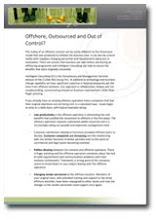Following the longest economic depression in British history, the UK economy is now recovering with a growth of 0.2% since the crisis began in 2008. But who do we have to thank for this long awaited rescue? Research suggests a marked post-war swing in economic power from manufacturing to services, but have the depression years accelerated the shift?
Despite manufacturing’s ongoing hype as the ‘future saviour of the
economic system’, official figures released last week from the Office of National Statistics
(ONS) tell a different story, with the industry shrinking by 7.4% since
2008. The spotlight now falls well and truly on the evolution of the ‘service
economy’.
Now accounting for four fifths of the total UK GDP, the service
sector grew by 2.9% in the same period with Retail & Wholesale (a
subcategory of the service sector) accounting for a whopping 11% of national
income alone. But with the price elasticity of demand significantly less for
services than for manufactured goods, it’s surely no surprise that the office
workers, recruitment consultants and health and social workers of the UK would
receive the credit for pulling the UK out of the economic depression.
With 2007 employment data showing a decrease of 339,000 people in
manufacturing, there is no doubt that many industries came out of the recession
in worse shape. Most significantly the postal, mining, construction and
production sectors suffered heavily. The financial sector was also hit hard
with a reduction in economic output of 19.2%. On the contrary, 438,000 more
employees have been recruited into office administrator roles in just the last
7 years; domestic workers increased by 22% and repair services by 44.9%. With
these figures in mind, it seems fair to assume that the fallout of the economic
crisis has provided a catalyst for growth in the service industry and decline
in manufacturing.
Coining the term ‘The David Brent Recovery’, journalist Ed Conway
discussed in an article for The Times the natural evolution of the economy,
highlighting that the down- or up-turn of industry sectors were already being
shaped long before the recession hit. With manufacturing accounting for 41% of
the British economy in 1948 and 14% in 2013, and the service industry
increasing from 46% to 79% in the same period, this seems an accurate
depiction.
As Conway concluded, as long as there is:
- Demand for such services
- The sustainable running of these services and
- Reduced reliance on the financial and property sectors,
the evolution (or revolution) of the ‘service economy’ is no bad
thing and, having generated significant amounts of income, has pulled the UK
out of its depression.
It is important, however, to remember that despite the fact
that manufacturing accounts for just 11% of the UK economy, and contrary to common
belief, UK manufacturing is currently the 11th
largest manufacturing nation in the world. The
‘service economy’ is evolving on a global platform and a developing product-service
continuum, whereby many products are transformed into services, out of which is
emerging many grey areas.








No comments:
Post a Comment